United States
A History of 'Jaywalking' Shame: Santa Claus, Boy Scouts, and Clowns
With jaywalking enforcement policies recently making news in New York City and Los Angeles, more of the media is pushing back on long-held assumptions about who rules the road. Here’s a primer on how jaywalking became a crime.
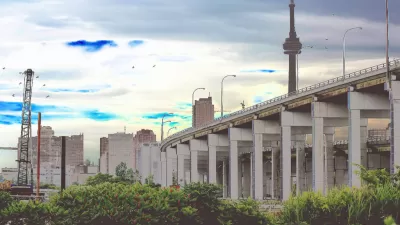
Ranking Freeways Without Futures
The Congress for the New Urbanism releases a Top 10 list highlighting the worst, most ready-to-be-junked urban freeways. New Orleans, Syracuse, and Detroit make the list. Boulevards are a viable and much-needed alternative, says CNU.
Americans and Dream Homes—A Love Story
Realtor.com has conducted a survey on the characteristics and trends in that feeling familiar to many a house hunter—falling in love with the perfect house. Yes, a “home crush” is a thing.

Where and How People Live Without Cars
The USA Today takes a closer look at data from the recent “Has Motorization in the U.S. Peaked?” report by Michael Sivak for the University of Michigan Transportation Research Institute.
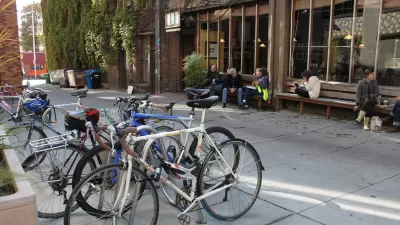
The Revitalizing Power of Alleys
Cities around the country are implementing alley improvement programs as a tool for neighborhood revitalization, with benefits to the economy and the environment. A recent article celebrates the strides cities have made in reclaiming alley spaces.
'Senior Villages' Gaining National Popularity
Reflecting a growing desire by seniors to live at home and stay in their lifelong neighborhoods, so-called ‘senior villages” are marshaling support and resource networks so seniors around the country can age in place.
How Does A Propane Shortage Strike Amidst A Production Boom?
Propane prices in some parts of the midwest and south had tripled; governors have demanded investigations into price gouging, and shelters have opened for those unable to afford the steep prices increases, yet production increased 15% from last year.
Panel Opposes Delisting Grey Wolves
The U.S. Fish and Wildlife Service wants to take the grey wolf off the Endangered Species list across most of the continental U.S. but a key panel determined their decision was based on questionable science that dealt with species identification.
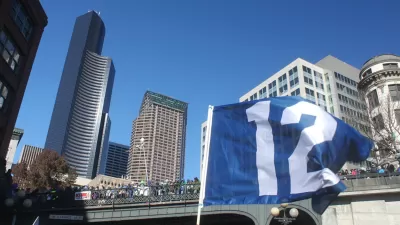
Placemaking Lessons Learned from Seattle's Super Bowl Parade
Last Wednesday, an estimated 700,000—more than the city's population of 635,000—welcomed the Seahawks home, without major incident. Writing in The Atlantic Cities, Chuck Wolfe describes five lessons for placemaking through words and photographs.
Friday Eye Candy: Mapping Urban Exercise Patterns
An enterprising blogger has produced a slew of urban maps with an overlay of publicly available data on exercise routes. In addition to being fetching, the patterns revealed show how runners make use of the public realm.
Starfish Are Mysteriously Dying by the ‘Tens of Thousands’
Up and down the West Coast, Texas, and in some places on the East Coast, starfish are dying off and washing up on shore in distressing quantities. The so-called "sea star wasting syndrome" has also been called a “mass mortality event.”
On the Impending Doom of the Land Line
Many of us grew up with the telephone as a central appliance in our homes, around which much energy and attention revolved. The days of the land-line telephone, however, are numbered.
Transportation Chair Endorses Mileage Fee—Why Is That Bad?
While road usage fee advocates may be celebrating this key endorsement of what many transportation experts view as the inevitable funding option, Streetsblog's Tanya Snyder is calling it a setback because of what else Rep. Bill Shuster did on Feb 4.
Feds Enforce First Crude By Rail Regulations
In the first case of its kind, federal regulators fined three oil companies for allegedly either failing to test, or improperly testing crude from the Bakken Shale in N.D., resulting in rail companies not knowing which type of oil tanker cars to use.
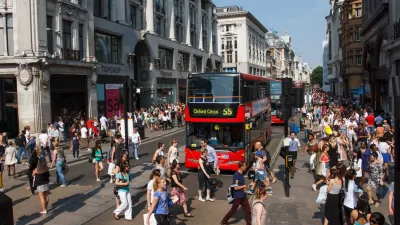
What Is 'Walkability,' Really?
Walkable developments are in demand, but what really makes a community "walkable"? It all boils down to three simple principles—physical access, proximity, and places—says John Lavey.
Train Stations Plan for the Future
In many places across the country, rail is breaking ridership records as we move away from the personal car. How does a rail hub manage the influx of passengers while being a good neighbor?
Will Chinatowns Soon Be Extinct?
The formation of Chinatowns in the United States began in the late 19th Century, and since then have provided an important immigrant gateway. But gentrification and rising expenses in U.S. cities are shrinking many Chinatowns.
New Statistics Reveal Post-Recession Paradigms of Population Growth
Governing takes a closer look at the U.S. Census Bureau’s most recent population estimates to reveal the data behind the country’s shifted migration patterns and present some ideas about what’s driving the new migration paradigms.
Why the U.S. is Auto-Dependent (and Europe isn't)
In the early part of the 20th century, Europe looked toward the U.S. to learn how to adapt cities to car travel, as difficult as that may seem. It wasn't until the 1990s, in the presence of sprawl and failing public transit that the pattern reversed.
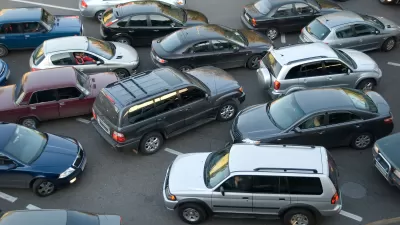
How the Daily Commute Hurts Civic Engagement
A contributing factor to widespread political disengagement? It's not what you might expect. Here's how the daily commute diminishes citizens' interest and ambition to get involved in their communities.
Pagination
Urban Design for Planners 1: Software Tools
This six-course series explores essential urban design concepts using open source software and equips planners with the tools they need to participate fully in the urban design process.
Planning for Universal Design
Learn the tools for implementing Universal Design in planning regulations.
planning NEXT
Appalachian Highlands Housing Partners
Mpact (founded as Rail~Volution)
City of Camden Redevelopment Agency
City of Astoria
City of Portland
City of Laramie


































